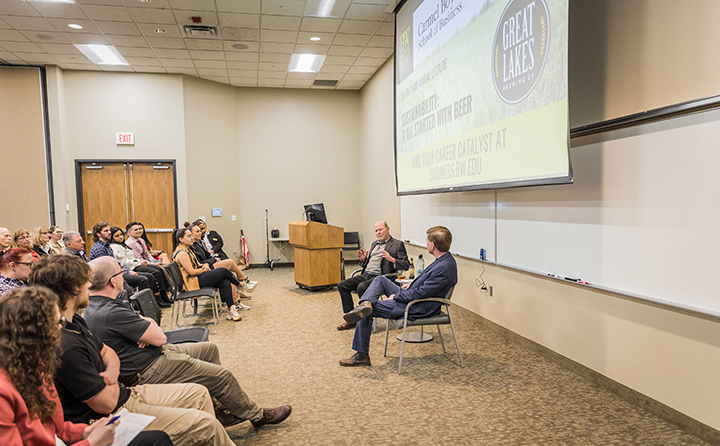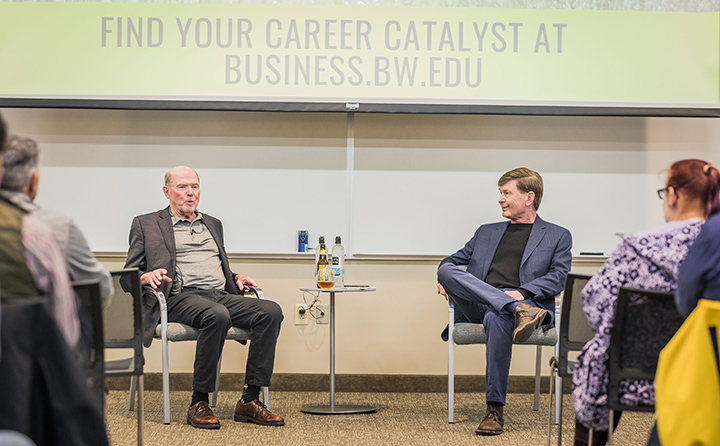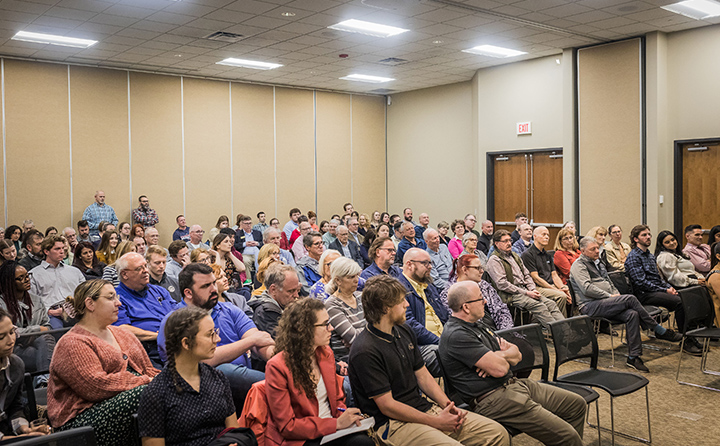BW tapped into the expertise of the co-founder of Northeast Ohio's original craft brewery for lessons on running a business that cares about profits, people and planet.

Attendees at Baldwin Wallace University's 2023 Spahr Chair Annual Lecture heard from one of the founding brothers of Great Lakes Brewing Company (GLBC), one of the largest independent craft breweries in the country.
Pat Conway talked about the craft brewery's past, present and future and his vision for growing the business. He also focused on sustainability and what Great Lakes Brewing Company has become known for in recent years - a "triple bottom line" strategy.
Conventionally, the triple bottom line contributes toward the "3 P's": Profits, People and Planet.
"This will be our 35th anniversary on September 6th, and [the triple bottom line] is more important now than ever," Conway noted. "It makes economic and moral sense."

While Great Lakes Brewing Company is privately held, its financial success is widely known and admired. At its inception, GLBC was the only craft brewery in Ohio. While Ohio is home to more than 300 breweries today, Great Lakes still ranks tops in Ohio and #18 in the nation among 9,000 craft breweries.
Beyond profit, people comprise a significant component of GLBC's triple bottom line. Conway notes that many factors and qualifications go into the hiring process, but two qualities rank the highest on the list of "must haves" for the Conway brothers: integrity and kindness.
Conway says those are attributes that cannot be taught. Great Lakes is a small family business that cares more about the nature of the people they have working for them than the type of skills they possess. In simpler terms, it is easier to teach someone a job skill than it is to teach someone to be compassionate.

Conway sees our planet as the most important resource for each and every one of us and believes it is critical that we continue to take care of it - both as people and businesses.
Great Lakes Brewing Company not only does a fantastic job of utilizing waste reduction but also is successful in giving back to Ohio City - where they originated back in 1988 and are still located to this day.
The company currently owns and operates the largest organic urban farm in the entire country to grow locally sourced produce and practices green waste reduction in many ways through a "circular economy." Spent brewer's grain becomes feed for the cattle, the cattle's waste becomes fertilizer in the organic urban farm, and low-fill beers become sauces, soups, sausage and even soap.
Conway's appearance at BW was part of the University's ongoing commitment to sustainability.
Green initiatives on campus include a wind turbine, two solar arrays, innovative recycling efforts, a sustainable living-learning community and five geothermal fields - including the first for a college residence hall - that heat and cool campus buildings.
A campus sustainability committee, composed of students, faculty and administrators, coordinates and encourages environmentally responsible practices that help create a more sustainable campus footprint, including composting food service waste; more efficient consumption of electricity, paper and water; the use of "green" cleaning products; and support for eco-friendly practices like bicycling.
BW also was the first college in Ohio to offer an undergraduate major in sustainability, where students learn to follow in Conway's footsteps creating a more sustainably successful business world.